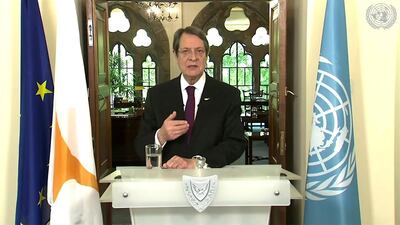Cyprus is committed to reunification talks with estranged Turkish Cypriots but not at gunpoint, President Nicos Anastasiades told the UN General Assembly on Thursday.
Mr Anastasiades was referring to a decades-long dispute between Greece and Turkey that has now stymied EU policy-making on Belarus.
EU member Cyprus, backed by Greece, is at odds with Turkey over maritime energy resources.
It is blocking EU sanctions on Belarus over election complaints until the bloc takes a tougher stance towards Ankara.
The US, Britain and Canada plan to impose sanctions on Belarusian people after what they regard as a rigged election on August 9 and violence against peaceful protesters since.
The EU is looking to impose similar sanctions.
“For the talks to resume with realistic prospects for success, it is imperative to create an environment that will be conducive for constructive and good faith negotiations, not under conditions of intimidation or threats,” Mr Anastasiades said.
Turkey has sent survey vessels close to Cyprus in areas that the Greek-Cypriot government has licensed to multinationals for oil and gas exploration.
French President Emmanuel Macron on Tuesday urged Turkish leader Recep Tayyip Erdogan to engage "without ambiguity" in easing tension that sparked fears of conflict with Greece in the Mediterranean.
Mr Macron pressed Turkey to "refrain from any new unilateral action likely to provoke tensions and to engage without ambiguity in the construction of an area of peace and co-operation in the Mediterranean", the Elysee said.
Cyprus was split after a Turkish invasion in 1974 started by a brief coup engineered by the military then ruling Greece.
The EU admitted the island, represented internationally by its Greek Cypriot government that effectively controls only its south, in 2004.
Its north is a breakaway Turkish Cypriot state.
The latest attempt at reunification between the two Cypriot sides collapsed in 2017. Each side blames the other for the failure.
Mr Anastasiades, who leads Cyprus’s internationally recognised government, repeated that his administration was willing to place any revenues from gas exploration into an escrow account for the Turkish Cypriot community.

